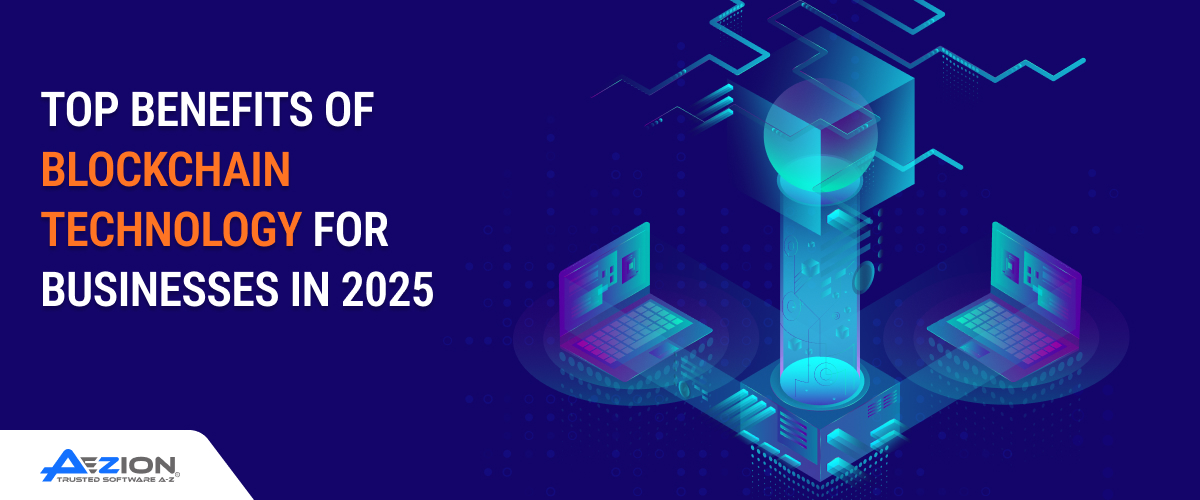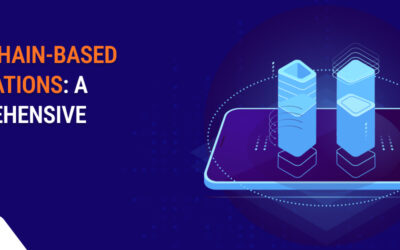Summary
Far beyond cryptocurrency, the benefits of blockchain span multiple sectors, unlocking integrity, speed, and trust in digital systems. Its decentralized, transparent design mitigates fraud, secures transactions, and empowers individuals with control over their data. This blog explores the full spectrum of blockchain’s technological and operational advantages across industries, navigating a digitally driven future.
Introduction
What is Blockchain Technology?
Benefits of Blockchain Technology
1) Building and Boosting Trust
Trust isn’tbuiltthrough promises;it’s built throughproof. Blockchain makestrustverifiable by recording every action in a tamper-proof format. Participants can trace every step, whetherabusiness deal or acharity donation.Thisfosters reliability in systems where trust hastraditionally been expensive orslowto establish.
2) Better Security and Privacy
3) Instant Traceability and Visibility
4) Enhanced Transparency
5) Improved Efficiency and Speed
6) Automation
7) Decentralized Structure
8) Reduced Costs
Fees from banks, brokers, or processors often pile up in traditional systems. Blockchain minimizes these by removing intermediaries and reducing reconciliation efforts. With fewer layers between sender and receiver, the benefits of blockchain become clear: leaner operations, quicker transactions, and lower expenses without compromising reliability or data security.
9) Immutability
Once information enters the blockchain, it stays unchanged. This permanence eliminates the risk of behind-the-scenes alterations, providing a reliable audit trail. Such blockchain advantages are crucial for sectors like finance or law, where historical accuracy is non-negotiable and tamper-proof records can determine the outcome of high-stakes decisions.
10) Individual Data Control
Rather than handing over data to third parties, blockchain lets individuals retain authority over their personal information. Users decide when, how, and with whom data is shared. This shift in control is one of the more human-centric blockchain benefits, empowering people in a world where privacy is often overlooked.
11) Tokenization
Blockchain allows real-world assets like property, art, or company shares to be represented as digital tokens. These tokens can be easily traded, divided, or stored, allowing access to markets once restricted by geography or capital. This innovative use is one of blockchain’s more transformative advantages today.
12) Innovation in Fraud Detection
Blockchain’s structure makes fraudulent activities far easier to spot and nearly impossible to conceal. Every transaction is logged, time-stamped, and permanently recorded, leaving no room for manipulation. This stands out as a critical blockchain benefit for industries vulnerable to scams, helping detect threats before they escalate into financial or legal disasters.
13) Contracts and Leases
Managing contracts often involves complex paperwork, delayed approvals, and legal ambiguity. Blockchain simplifies this by digitizing agreements and enabling self-executing clauses. Parties can trust that terms will be fulfilled automatically, with no room for misinterpretation. This clarity and speed highlight a practical blockchain advantage in real estate, rentals, and legal agreements.
14) International Trade
Cross-border transactions are often tangled in currency conversions, lengthy paperwork, and trust barriers. Blockchain breaks through these hurdles by offering a unified, verifiable system that streamlines customs, payments, and logistics. The benefits of blockchain here include reduced delays, fewer disputes, and smoother trade between nations, without needing to reinvent existing frameworks.
15) Settlement of Securities
Traditional securities trading involves a chain of intermediaries, delayed settlements, and hidden costs. Blockchain shortens this timeline by enabling near-instant settlement with direct ownership transfer. This not only reduces risks but also enhances liquidity. Among the benefits of blockchain are faster, more transparent trading, which stands out in modern financial ecosystems.
Industry Examples That Benefit From Blockchain
Blockchain isn’t limited to one domain—it’s quietly reshaping how entire industries function. Its impact is deep and wide, from healthcare and finance to education and governance. By applying the benefits of blockchain to real-world processes, organizations are unlocking stronger trust, faster delivery, and smarter control over information.
1) Financial Institutions
Banks and investment firms are no strangers to complexity. Blockchain cuts through the clutter by simplifying payments, streamlining compliance, and making transactions traceable and permanent. The resulting blockchain benefits include lower fraud risks, faster processing, and real-time reporting advantages that align with the precision and security demanded in financial services.
2) Healthcare Organizations
Data accuracy and privacy can mean the difference between life and liability in healthcare. Blockchain offers a secure, tamper-resistant way to store patient records, track pharmaceuticals, and manage consent. These blockchain benefits empower patients with control while giving providers reliable access, reducing errors, and improving care.
3) Voting Systems
Elections demand transparency, security, and public confidence, yet they’re often vulnerable to manipulation or mistrust. Blockchain introduces a verifiable and tamper-proof digital voting system, where each vote is recorded immutably. Among the most compelling blockchain advantages, this ensures electoral integrity while maintaining voter anonymity and streamlining the counting process.
4) Nonprofit and Government Agencies
When public trust is low, transparency becomes critical. Blockchain allows agencies to record donations, spending, and program outcomes in a public ledger, removing ambiguity and misuse. These blockchain benefits help restore accountability, improve service delivery, and demonstrate ethical stewardship in humanitarian aid and government-funded initiatives.
5) Supply Chain Management
Global supply chains often tangle in paperwork, delays, and blind spots. Blockchain introduces clarity by recording every transaction, shipment, and handoff in real-time. This visibility reduces fraud, prevents counterfeiting, and strengthens vendor accountability, making blockchain benefits especially valuable in industries like food, fashion, and pharmaceuticals.
6) Real Estate
Property transactions often involve lengthy verifications, title disputes, and opaque processes. Blockchain streamlines buying, selling, and leasing by creating tamper-proof records and automating contract execution. These blockchain benefits reduce paperwork, speed up closing times, and build confidence among buyers, sellers, and regulators in high-stakes property exchanges.
7) Intellectual Property and Copyrights
Creators often struggle to prove ownership or track unauthorized use of their work. Blockchain addresses this by time-stamping creations on a public ledger, offering indisputable proof of origin. These blockchain benefits help artists, writers, and inventors protect their rights, automate royalty payments, and discourage infringement in the digital age.
8) Energy Sector
Energy grids are evolving, and blockchain is powering that shift. It enables peer-to-peer energy trading, real-time usage tracking, and transparent billing—all without a central utility. These blockchain benefits allow consumers to sell excess power, monitor sustainability metrics, and reduce waste in a system that is often difficult to regulate efficiently.
9) Education and Academic Credentials
Diplomas, transcripts, and certifications are often lost, forged, or hard to verify. Blockchain provides a permanent and tamper-proof record of academic achievements, instantly accessible to employers and institutions. This blockchain benefit enhances trust in qualifications, speeds up recruitment, and reduces the need for manual credential validation in global education systems.
10) Legal Industry
The legal field thrives on accuracy, timing, and accountability qualities that blockchain delivers effortlessly. From storing evidence to automating contracts, it reduces human error and enhances case transparency. These blockchain benefits redefine how documents are filed, agreements enforced, and records maintained, bringing clarity to even the most complex legal processes.
11) Entertainment and Media
Artists and content creators often lose control over how their work is distributed or monetized. Blockchain enables direct licensing, real-time royalty tracking, and clear ownership records. These blockchain benefits protect intellectual property, cut out exploitative intermediaries, and allow creators to earn fairly and transparently in the digital entertainment industry.
Conclusion
The benefits of blockchain are reshaping how industries manage data, trust, and transactions. But unlocking its full value requires more than just interest; it demands expertise. As a business owner, you can also get in touch with a leading Custom Software Development Company to help you design, build, and implement blockchain systems tailored to your business needs, for security, scalability, and real-world impact.
Frequently asked Questions:
1) How does blockchain improve data security?
Blockchain stores data in a distributed, tamper-proof format. Each transaction is encrypted and linked to the previous one, making unauthorized changes nearly impossible, and an approach far more secure than centralized systems.
2) Can small businesses benefit from blockchain?
Yes. Even small businesses can use blockchain for transparent record-keeping, smart contracts, and secure payments. The blockchain benefits are scalable and can simplify operations without heavy infrastructure.
3) Is blockchain only useful for cryptocurrency?
Not at all. While it powers cryptocurrencies, its value lies in use cases like supply chains, healthcare, identity management, and legal contracts, offering broader blockchain advantages across industries.
4) How do I get started with blockchain for my business?
Consulting a Digital Engineering Solutions Company is a smart first step. They can assess your business goals, identify where blockchain fits, and guide the technical implementation from design to deployment.
5) What makes blockchain trustworthy?
Blockchain’s trustworthiness comes from its transparency and immutability. Everyone sees the same data, and no one can secretly alter it. This ensures integrity in every transaction or record.



